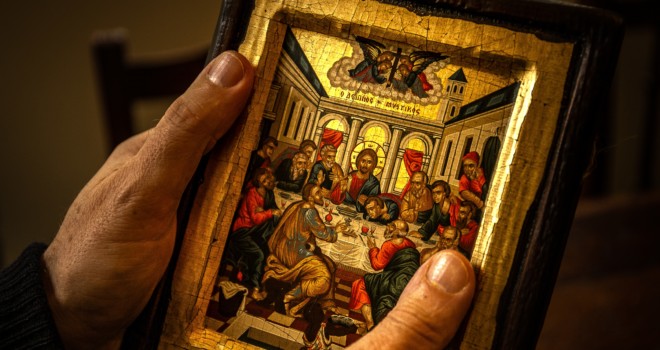The closing section of Pope Francis’s exhortation On The Call to Holiness is entitled, Spiritual Combat, Vigilance, and Discernment. In the previous chapter, Pope Francis gave us the road-map to living in the light. These traits placed the saints in a place where they can look their rival in the eyes and triumph. Now, at the end of his work, the Holy Father wants to be absolutely clear:
“The Christian life is a constant battle. We need strength and courage to withstand the temptations of the devil and to proclaim the Gospel. This battle is sweet, for it allows us to rejoice each time the Lord triumphs in our lives” (#158).
The war is not just about conquering our weaknesses, it is about confronting and defeating the reality of evil itself. In order to be victorious we need to stand with Christ by:
- 1. Admitting and knowing the devil is real (#160),
- 2. Being alert and aware of the fact that we are in this battle while trusting in God’s victory (#162, 163),
- 3. Acknowledge that at times we are corrupt without being blind to our failures (#165),
- 4. Discern life decisions rather than simply go with the flow (#167).
Despite past confusion over the words that the Holy Father never spoke: the devil is real and evil is not a myth (#160). Jesus specifically names our enemy as Satan and he himself enters the battleground of death to defeat the evil one. This reality is in the forefront especially during Lent when we mark out and remember the 40 days Jesus spent in the desert being tempted by the evil one.
We only hear about the three famous temptations found in the gospels, but then at the end of the passage we hear that the devil, “departed from him for a while” (Luke 4:13). The devil’s return was inevitable, but Jesus’ victory was certain. The battle had only just begun. Christ always conquers the dark, but the darkness always gives its best shot.
“We should not think of the devil as a myth, a representation, a symbol, a figure of speech or an idea. This mistake would lead us to let down our guard, to grow careless and end up more vulnerable. The devil does not need to possess us” (#161).
Christ does not give in to temptation in the desert, he drives demons from a countless number of men and women, and he triumphs over the evil one’s seemingly greatest “victory”: death itself. If the consequence of sin is death, and we truly believe in the resurrection then every decision we make should be chosen in light of the empty tomb.
Once we admit, recognize, and name our enemy we can run in the opposite direction when it appears. Vigilance keeps the Christian from spiritual blindness which is a “comfortable and self-satisfied form of blindness” (#165). Unawareness of what lies before and ahead of us is the recipe for defeat.
Jesus teaches that his followers should keep watch and stay awake. When we do so we place ourselves in the position to know when the serpent shows up and it gives us the weapons we need to crush its head while it strikes at our heel. Then we will know how to decipher, discern, and choose the author of life over the author of lies.
A vigilant soul will
utilize proper discernment during the everyday moments of life. Discernment is
a major theme of the pope’s exhortation and it is how he chooses to come to a
close. Discernment
is not figuring out what else we can get out of life, but a recognition of how
we can accomplish our mission given to us by God (#174). Through proper
discernment we know what to do, how to do it, and when to do it. The Lord works
in his own time and calls us to a holy patience that trusts completely in his
ability to conquer. This allows us to reign victorious with the Lord.
The Kingdom is our promise. However, we must always remember that following our call to holiness means that we keep the cross as our logic. Our road to union with God will often be lived in the shadow of the cross, but our sufferings make us who we are: men and women singled out to live in the light that shines brightly from the face of our God.
✠
Editor’s note: This article is the final part in the series “Focus on Holiness,” which is an exploration of Gaudete et exsultate and how we can apply its lessons to grow in holiness.
Photo by James Coleman on Unsplash












